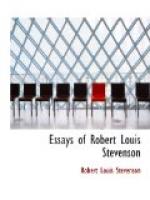the flow of his Horatian humours. His mirth has
something of the tragedy of the world for its perpetual
background; and he feasts like Don Giovanni to a double
orchestra, one lightly sounding for the dance, one
pealing Beethoven[24] in the distance. He is
not truly reconciled either with life or with himself;
and this instant war in his members sometimes divides
the man’s attention. He does not always,
perhaps not often, frankly surrender himself in conversation.
He brings into the talk other thoughts than those
which he expresses; you are conscious that he keeps
an eye on something else, that he does not shake off
the world, nor quite forget himself. Hence arise
occasional disappointments; even an occasional unfairness
for his companions, who find themselves one day giving
too much, and the next, when they are wary out of
season, giving perhaps too little. Purcel[25]
is in another class from any I have mentioned.
He is no debater, but appears in conversation, as
occasion rises, in two distinct characters, one of
which I admire and fear, and the other love. In
the first, he is radiantly civil and rather silent,
sits on a high, courtly hilltop, and from that vantage-ground
drops you his remarks like favours. He seems
not to share in our sublunary contentions; he wears
no sign of interest; when on a sudden there falls
in a crystal of wit, so polished that the dull do
not perceive it, but so right that the sensitive are
silenced. True talk should have more body and
blood, should be louder, vainer and more declaratory
of the man; the true talker should not hold so steady
an advantage over whom he speaks with; and that is
one reason out of a score why I prefer my Purcel in
his second character, when he unbends into a strain
of graceful gossip, singing like the fireside kettle.
In these moods he has an elegant homeliness that rings
of the true Queen Anne. I know another person[26]
who attains, in his moments, to the insolence of a
Restoration comedy, speaking, I declare, as Congreve[27]
wrote; but that is a sport of nature, and scarce falls
under the rubric, for there is none, alas! to give
him answer.
One last remark occurs: It is the mark of genuine
conversation that the sayings can scarce be quoted
with their full effect beyond the circle of common
friends. To have their proper weight they should
appear in a biography, and with the portrait of the
speaker. Good talk is dramatic; it is like an
impromptu piece of acting where each should represent
himself to the greatest advantage; and that is the
best kind of talk where each speaker is most fully
and candidly himself, and where, if you were to shift
the speeches round from one to another, there would
be the greatest loss in significance and perspicuity.
It is for this reason that talk depends so wholly
on our company. We should like to introduce Falstaff
and Mercutio, or Falstaff and Sir Toby; but Falstaff
in talk with Cordelia seems even painful. Most
of us, by the Protean[28] quality of man, can talk
to some degree with all; but the true talk, that strikes
out all the slumbering best of us, comes only with
the peculiar brethren of our spirits, is founded as
deep as love in the constitution of our being, and
is a thing to relish with all our energy, while, yet
we have it, and to be grateful for forever.




